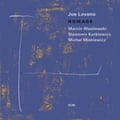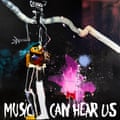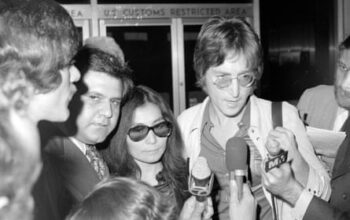The story of one of the most extraordinary bands in rock history began in the most ordinary of ways, with school kids walking down the street. “It was a Friday or Saturday night, and I was going off to the cinema,” recalls Ivor Hay. “And there was Ed and Chris, and they were going off to a party. They asked if I wanted to come. We’re 15 or 16, and we managed to get a bottle of something. We drank, and we ended up talking and singing. And that’s how we ended up doing things together.”
Ed was Ed Kuepper; Chris was Chris Bailey. And the three of them, kids in Brisbane at the start of the 70s, would become the Saints, the band that kickstarted Australian punk, the band who released their first, thrilling single (I’m) Stranded in September 1976 – before the Damned or the Pistols or the Clash had got anything out – and then arrived in the UK the following year as a fully formed maelstrom of intensity and ambition.
Now the band’s debut album has been reissued in a deluxe box set edition, and Kuepper and Hay have assembled a band to perform together, first in Australia but with hopes of coming to Europe. Mudhoney’s Mark Arm is singing in place of Bailey, who died in 2022, and fellow heroes of Australian alternative music Mick Harvey (Birthday Party, Bad Seeds) and Peter Oxley (Sunnyboys) complete the lineup.
“Chris and I had met in school detention,” Kuepper says. “We were both outsiders in terms of music and politics.” And in Brisbane, in Queensland, it wasn’t hard to feel like an outsider. The state was run by a hard-right premier, Joh Bjelke-Petersen, and it was not a place in which youthful exuberance was encouraged.
“When you’re living in it, you get used to it,” Hay says. “It’s like the frog in the boiling water – you never really kind of notice as the temperature rises. But whenever you went out, there was always the feeling that the police will come and grab you. If you were under 20, you were a target.”
Once they started writing songs, the trio – especially Kuepper, with his ultra-fast, ultra-tough guitar playing – divined the energy of the earliest rock’n’roll, filtered through the energy and aggression of the Stooges, with a big dose of homegrown garage rock heroes the Masters Apprentices.
“I had a pretty good idea of what I wanted to sound like,” Kuepper says. “And Chris was just a natural as a singer. We were working on something that was, in my mind, completely unique.” You can hear quite how focused that vision was on a set of home recordings from 1974, later released as The Most Primitive Band in the World: this is quite clearly high-energy punk rock, before the fact.
The only problem was that no one knew who they were, and there was virtually no opportunity to play in Brisbane. “In Queensland, the music industry was dominated by one promoter,” says Kym Bradshaw, who joined as bassist in 1976. “He wanted bands who only played covers like Smoke on the Water, and the Saints were never going to do that.”
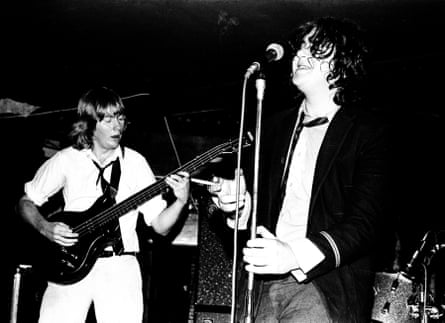
“I had a fairly romantic idea that we would just cut through with the purity of our vision,” Kuepper says. “That because we were so different to everything else in town it would have a massive drawing effect – which it didn’t.”
In June 1976, the Saints went into the studio and cut (I’m) Stranded, pressing just 500 copies. Few in Australia cared, but Kuepper sent copies to the English music press. “Single of this and every week,” wrote Jonh Ingham in Sounds. The response led EMI in the UK to order the Australian branch of the label to sign up the band, and they recorded their first album at the end of the year, releasing it in February 1977. Now the time had come to leave home.
First, the band began playing around Sydney and Melbourne in early 1977, which was a mixed experience. “A lot of people had started to hear about us, but they hadn’t heard us,” Kuepper says. “We did some ridiculous shows in Sydney. We played with the Ritchie Family, who were an American disco group. Who came up with that idea?”
But one Sydney show – featured in the new box – did pass into legend. On 21 April 1977, the Saints played alongside local proto-punk legends Radio Birdman at Paddington Town Hall, and Bailey sarcastically thanked “the local chapter of the Hitler Youth” for decorating the venue with Radio Birdman’s red and black military-styled insignia.
Mythology records this as some huge event, though the video of the show shows an audience entirely unbothered. “Some people took offence at Chris’s commentary,” Kuepper says. “And it was a small scene, so it became a big thing. But most people didn’t give a shit.” Nevertheless, the sheer power and velocity of the band is evident from the footage, Hay driving the band with ferocious drumming.
By early summer, the Saints were in the UK. “It was absolutely necessary for us to move to London,” Kuepper says. “It was just planned to be a couple of months to tour and maybe do some recording, but it was really enjoyable, and it was really promising. And so we decided there was absolutely no reason for us to move back to Australia.”
Things began promisingly. Their single This Perfect Day – arguably the single most exciting song from the first wave of punk – hit No 34 in the charts and the band appeared on Top of the Pops, Bailey throwing forth nihilism in a Jaggeresque drawl over backing that sounded like the end of the world: “I need nothing / Don’t need no one / I need nothing / Nothing at all.”
after newsletter promotion
They didn’t look like punks: they wore street clothes, and Bailey even had long hair. While some were dismayed, others were inspired. “I remember Mark E Smith talking about seeing the Saints on the TV,” Mick Harvey says. “He loved them because they were just wearing old jumpers. He could see that they were not part of any kind of fashion or movement. They were just in their own zone and didn’t care about anything else.”
This Perfect Day, though, didn’t rise in the charts after Top of the Pops. EMI, for whatever reason, failed to press enough copies, and with no one able to buy it, the single rapidly disappeared. Artistically, the band were reaching a high point, but already things were beginning to go wrong.
The second and third Saints albums – Eternally Yours and Prehistoric Sounds – departed from the punk template, adding horns, incorporating hints of soul, and straying into the edges of post-punk before punk even entered its post-phase. They were remarkable and brilliant, but not what anyone particularly expected or wanted outside the Saints, or even in some cases within the Saints.
Hay says EMI regarded them as mere “colonials”, rarely considering their interests. As 1977 progressed and punk ossified into a series of postures – pogoing, gobbing, lowest common denominator riffing – the band felt more and more at odds with the scene they thought would welcome them. Bradshaw left during 1977, and Bailey was growing disillusioned as well.
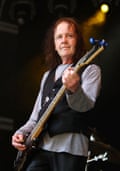
“Initially, Chris had the time of his life,” Kuepper says. “But I wanted to push things musically in a way he didn’t see eye to eye with. He was starting to write more himself – I had always rejected his songs. I feel bad about that these days. But they weren’t representative of what we were doing.”
Bailey was so unhappy that Kuepper had to talk him out of leaving before they recorded Prehistoric Sounds, and as soon as it was released, the band was dropped by EMI and fell apart. Bailey would soon take the name for himself, and put together a new and very different version of the Saints. But in the intervening years, the original Saints began to assume their position of one of the pioneers of both punk and Australian rock.
“There were two of the best songwriters Australia has ever produced in that band,” Mick Harvey says. “Australians, in their bizarre way, are very proud that this crazy band from Brisbane went over and showed there was stuff happening in Australia that you couldn’t have imagined.”
Bradshaw remembers being back in Brisbane “a little while ago, and there’s a huge mural – it must be 100 yards long – and it’s all about the Saints. Years ago, there was a G8 summit in Brisbane – all the world leaders there – and they produced a guide to the 10 most important things about Brisbane. No 8 was the Saints.”
Source: theguardian.com
